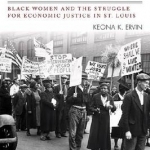Gateway to Equality: Black Women and the Struggle for Economic Justice in St. Louis
BookThis item doesn’t have any media yet
2017 | Gender Studies
Like most of the nation during the 1930s, St. Louis, Missouri, was caught in the stifling grip of the Great Depression. For the next thirty years, the Gateway City continued to experience significant urban decline as its population swelled and the area's industries stagnated. Over these decades, many African American citizens in the region found themselves struggling financially and fighting for access to profitable jobs and suitable working conditions. To combat ingrained racism, crippling levels of poverty, and substandard living conditions, black women worked together to form a community-based culture of resistance - fighting for employment, a living wage, dignity, a better welfare system, and quality public housing. In this impressive study, Keona K. Ervin reinterprets the history of these social movements by chronicling the resistance and collective actions of domestic workers, food processors, clerks, defense workers, garment makers, public housing tenants, welfare recipients, and the unemployed. She argues that working-class women's self-organization for economic dignity shaped both the black freedom struggle and trade union activism in St.
Louis and contributed to larger visions of a democratic social contract. Throughout, Ervin presents a stunning account of the ways in which black working-class women creatively fused racial and economic justice. By illustrating that their politics played an important role in defining urban political agendas, her work sheds light on an unexplored aspect of community activism and illuminates the complexities of the overlapping civil rights and labor movements during the first half of the twentieth century.
Related Items:
| Published by | The University Press of Kentucky |
| Edition | Unknown |
| ISBN | 9780813168838 |
| Language | N/A |
Images And Data Courtesy Of: The University Press of Kentucky.
This content (including text, images, videos and other media) is published and used in accordance
with Fair Use.
